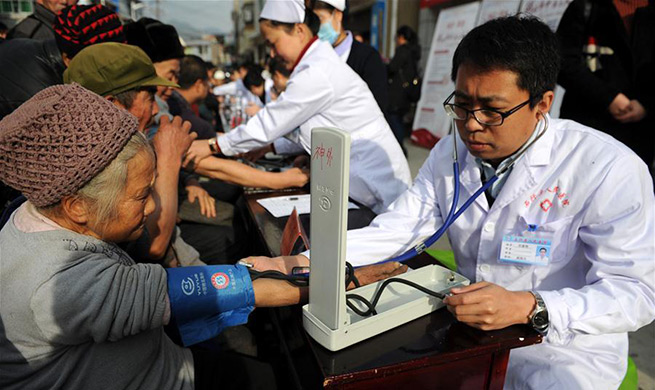CHICAGO, Dec. 18 (Xinhua) -- Women with polycystic ovary syndrome develop metabolic syndrome earlier than women without the condition, which might put them at higher risk of developing diabetes and cardiovascular disease, according to a study by the University of Michigan (UM).
UM researchers used data from the Michigan Bone Health and Metabolism Study, a longitudinal, community-based study of white women in southeast Michigan started at UM in 1988. Researchers identified women with polycystic ovary syndrome-like status based on their history of irregular menstrual cycles, high free-androgen index and high levels of anti-mullerian hormone.
Among the 496 women in the analysis, 12 percent were determined to likely have polycystic ovary syndrome. Over a mean follow-up of 11 years, women with polycystic ovary syndrome developed metabolic syndrome nearly three years earlier than women without the condition, even after accounting for differences in smoking, education, physical activity and body size.
However, in both groups, increased body size was associated with greater risk of metabolic syndrome.
"Although our study suggests that polycystic ovary syndrome predicts earlier onset of metabolic syndrome independent of body size, weight is still a substantial risk factor for poor health outcomes," said lead author Mia (Qing) Peng, a doctoral student at UM's School of Public Health. "This means that regardless of whether you have polycystic ovary syndrome or not, maintaining a healthy weight is very important, but maintaining a healthy weight may be even more relevant for women with polycystic ovary syndrome."
"The contribution of our study is that by looking at women in a community-based sample, we are able to include a broader spectrum of women with polycystic ovary syndrome," said Peng. "Thus, our estimates are likely more representative of the true impact of polycystic ovary syndrome on metabolic syndrome."
Polycystic ovary syndrome is a hormonal disorder that can affect women's periods, making them infrequent, irregular or prolonged, and can also make it difficult to get pregnant. It affects 1 in 10 women of childbearing age. Metabolic syndrome is usually defined as the presence of three or more of the following health conditions: excess body fat around the waist; elevated blood pressure; elevated triglycerides, a type of fat in your blood; elevated blood sugar and low HDL.
The study has been published in The Journal of Clinical Endocrinology & Metabolism.

















